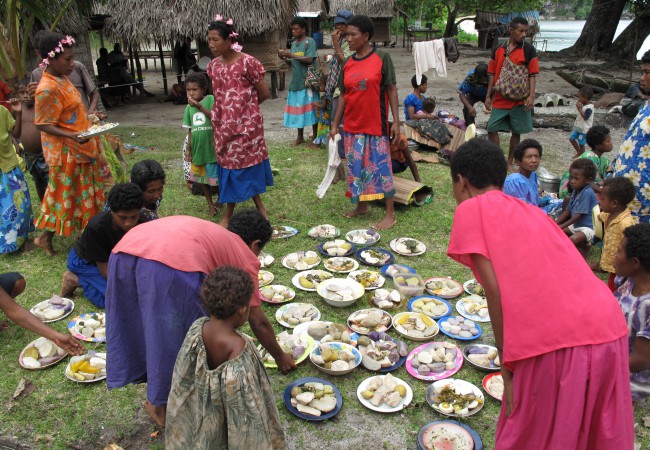
FOOD FOR THOUGHT
When Cyclone Yasi hit the southern islands of Vanuatu earlier this year, it destroyed many of the gardens that people rely on. But people in the Pacific have long developed methods of preserving food and surviving when affected by drought and cyclones.
‘When cyclones knock over our banana and manioc, we use the leaves to cover them up until they are ripe’ says Mary from Tanna. ‘We also use black palm to scrape and pound the young bananas, which makes them soft and we can make laplap. Also, the young manioc can be buried and stored underground for up to three months so we have something to eat until our gardens start to grow back again.’ These remain important customs for survival, but Mary worries that some of this knowledge is being lost. ‘After Cyclone Yasi, everyone expected the government to come and help them. It took a long time and when finally the government did respond by bringing rice, there were disputes over whether distribution was fair. It is important that our community remembers our customs so we can rely on ourselves for food, especially during disasters’.
It is not only natural disasters that are impacting on food security. The Pacific has become a region of contradictions when it comes to food: once abundant, there are now increasing pockets of malnutrition and hunger, especially among rural and peri- urban children, while at the same time the Pacific has some of the highest levels of obesity and diabetes in the world.
The key messages of this paper are:
- There is a risk of increased malnutrition and hunger in the Pacific. Rapid urbanisation has left the urban poor without access to land and income opportunities, while climate change is putting pressure on the regions rural food producers.
- Agricultural productivity has declined in previous decades. In 2007, productivity in the Pacific was only 22% of the developing country average.
- Fisheries and agricultural led economic growth can improve food security. Growing a diverse range of high value crops, and getting a fairer deal on tuna, will help the Pacific realize its economic advantages. Long-term growth will also require increased investment and careful land reform.
- The use of traditional techniques to manage natural disasters has long proven successful in the Pacific. But there is room to improve these techniques with advanced research to build future resilience.

